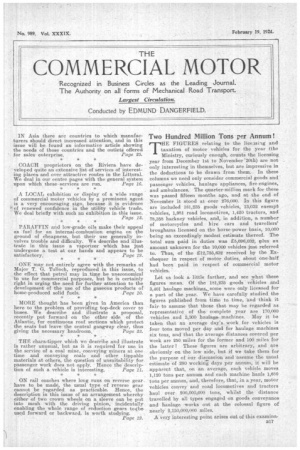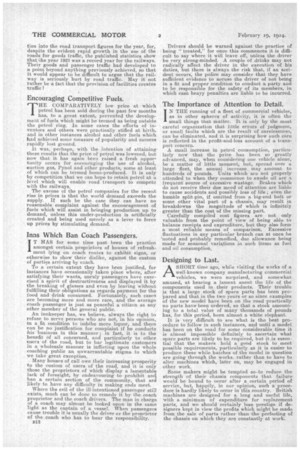Two Hundred Million Tons per Annum !
Page 1

Page 2

If you've noticed an error in this article please click here to report it so we can fix it.
THE FIGURES relating to the lice ising and taxation of motor vehicles for the year (the Ministry, curiously enough, counts the licensing year from December 1st to November `30th) are not only interesting in themselves, but are impressive in the deductions to be drawn from them. In these columns we need only consider commercial goods and passenger vehicles, haulage appliances, fire-engines, and ambulances. The quarter-million mark for these was passed fifteen months ago, and at the end of November it stood at over 276,000, In this figure are included 181,235 goods vehicles, 13,032 exempt vehicles, 1,981 road locomotives, 1,420 tractors, and 78,358 hackney vehicles, and, in addition, a number of motorcycles and hire cars and travellers' broughams licensed on the horse-power basis, 10,000 being an exceedingly modest estimate thereof. The total sum paid in duties -was £5,696,032, plus an amount unknown for the 10,000 vehicles just referred to. Thus, of the 212,755,632 received by the Exchequer in respect of motor duties, about one-half had been paid in respect of commercial motor vehicles.
Let us look a little farther, and see what these figures mean. Of the 181,235 goods vehicles and 3,401 haulage machings,„some were only liceased for a part of the year. We have carefully studied the figures published from time to time, and think it fair to assume that those that may be regarded as representative of the complete year are 170,000 vehicles and 3,300 hindagemachines. May it be taken that an average day's work for vehicles is four tons moved per day and for haulage machines six tons, and that the average distances covered per week are 250 miles for the former and 100 miles for the latter ? These figures are arbitrary, and are obviously on the low side, but if we take them for the purpose of Our discussion and assume the usual estimate of 280 workirila. days per annum, it will be apparent that, on an average, each vehicle moves 1,120 tons per annum and each machine hauls 1,680 tons per annum, and, therefore, that, in a year, motor vehicles convey and road locomotives and tractors haul over 200,000,000 tons, whilst the distance travelled by all types engaged on goods conveyance and haulage -works out at the colossal figure of nearly 2,150,000,000 miles, ..A very interesting point arises out of this examinaB17 tion into the road transport figures for the year, for, despite the evident rapid growth in the use of the roads for goods traffic, the published statistics show that -lhe year 1923 was a record year for the railways. Their goods and passenger traffic had developed to a point beyond anything previously achieved, so that it would appear to be difficult to argue that the railway is seriously hurt by road traffic. May it not rather be a fact that the provision of facilities creates traffic?
Encouraging Competitive Fuels.
THE COMPARATIVELY low price at which petrol has been sold during the past few months has, to a great extent, prevented the development of fuels which might be termed as being outside the petrol ring. In some cases the efforts of inventors and others were practically stifled at birth, and in other instances alcohol and other fuels which had achieved some measure of popularity and success rapidly lost ground. It was, perhaps, with the intention of attaining these results that the price of petrol was lowered, but now that it has again been raised a fresh opporL tunity occurs for encouraging the use of alcohol, euetion gas, Pynoi and other products, some at least of Which can be termed home-produced. It is only by competition that we can hope to retain petrol at a level which will enable road transport to compete with the railways. The excuse of the petrol companies for the recent rise in prices is that the world demand exceeds the supply. If such be the case they can have no reasonable complaint against the encouragement of fuels which will assist in bringing production up to demand, unless this under-production is artificially created and being used merely as a lever to force up prices by stimulating demand.
Inns Which Ban Coach Passengers.
IT HAS for some time past been the practice amongst certain proprietors of houses of refreshment lying on coach routes to exhibit signs, or otherwise to show their dislike, against the custom of parties arriving by coach. To a certain extent they have been justified, for Instances have occasionally taken place where, after satisfying their wants, unruly passengers have exercised a spirit of destructiveness and displayed it by the breaking of glasses and even by leaving without fulfilling their obligations as regards payment for the food and drink consumed. Fortunately, such cases are becoming more and more rare, and the average coach passenger is just as peaceful a citizen as any other member of the general public. An innkeeper has, we believe, always the right to refuse to serve persons who are not, in his opinion, in a fit condition to imbibe more liquor, and there can be no justification for complaint if he conducts his business in this manner ; in fact, it is to the benefit of all concerned, and particularly to other [users of the road, but to bar legitimate customers in A wholesale manner is inflicting upon the whole coaching public an, unwarrantable stigma to which we take great exception. . Many houses of call owe their increasing prosperity to the custom of users of the road, and it is only those the proprietors of which display a lamentable lack of foresight, by endeavouring to prohibit and ban a certain section of the community, that aro likely to have any difficulty in making ends meet. Where the evil of the ill-intentioned passenger still exists, much can be done to remedy it by the coach proprietor and the coach drivers. The man in charge of a coach may almost be looked upon in the same light as the captain of a vessel. When passengers cause trouble it is usually the driver or the proprietor of the coach who has to -bear the responsibility.
B18
Drivers should be warned against the practice of being " treated," for once this commences it is difficult to say Where it will leave off, unless the driver be very strong-minded. A couple of drinks may not radically affect the driver in the execution of his duties, but there is always the risk that, if an accident occurs, the police may consider that they have sufficient evidence to accuse the driver of not being in a fit and proper condition to conduct a party and to be responsible for the safety of its members, in which Case heayy penalties are liable to be incurred.
The Importance of Attention to Detail.
IN THE running of a fleet of commercial vehicles, as in other spheres of activity, it is often the small things that Matter. It is only by the most careful organization that little errors of judgment, or small faults which are the result of carelessness, can be eliminated, and it is surprising how Such care is reflected in the profit-and-loss account of a transport concern. A small increase in petrol consumption, particularly now that the price has been so greatly advanced, may, when considering one vehicle alone, be a matter of little moment, but, spread over a large -fleet, the annual increase may amount to hundreds of pounds. Units which are not properly attended to when they commence to exude oil ate a frequent source of excessive wastage. Brakes which do not receive their due meed of attention are liable to cause accidents and possibly loss of life ; even the humble split-pin, if omitted from a big-end bolt or some other vital part of a chassis, may result in breakdowns the magnitude of which is infinitely greater than the cost of the missing part. Carefully compiled cost figures are not only valuable from the point of view of being able. to balance receipts and expenditure, but they also form a most reliable means of comparison. Excessive fluctuations in any particular branch can at once be 'noted and probably remedied, due allowance being made for seasonal variations in such items as fuel and oil consumption.
Designing to Last.
SHORT time ago, while visiting the works of a well-known company manufacturing commercial vehieles, we were surprised, and somewhat amused, at hearing a lament anent the life of the components used in their products. Their trouble is that a large stock of spare parts has been prePared and that in the two years or so since examples of the new model have been on the road practically no parts have been ordered, so that a stock amounting to a total value of many thousands of pounds has, for this period, been almost a white elephant. It is very difficult to see what is the best procedure to follow in such instances, and until a model has been on the road for some considerable time it is almost impossible definitely to ascertain what spare parts are likely to be required, but it .is essential that the makers hold a good stock to meet possible requirements, particularly as it is easier to produce these while batches of the model in question are going through the works, rather than to have to alter machines which, later on, may be engaged in other work.
Some makers might he tempted so,to reduce the strength of their chassis components that failurewould be bound to occur after a certain period of service, hut, happily, in our opinion, such a procedure is hardly likely to occur in this country. British machines are designed for a long and useful life, -with a minimum of expenditure for replacement parts, and we should certainly .lose prestige if designers kept in view the profits which might be made from the sale of partsrather than the -perfecting of the chassis on which they are constantly at work:
































